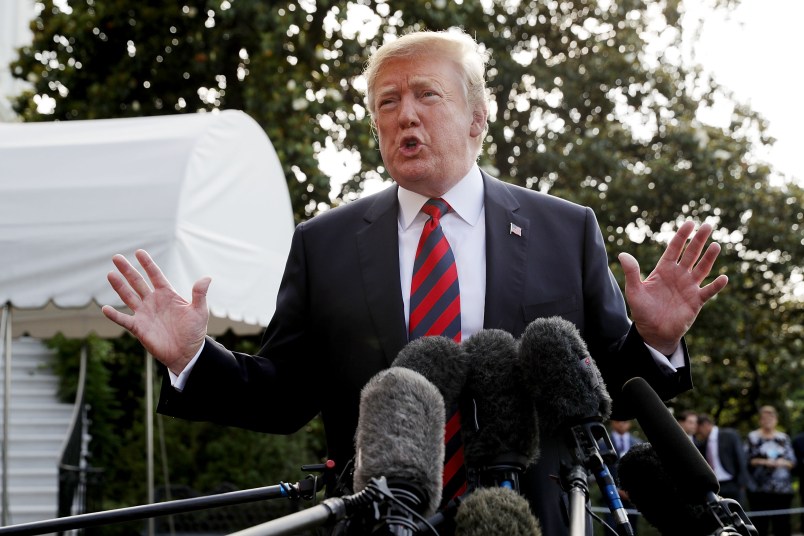There are certain frameworks and situations in the law in which it does not matter why something happened, it simply matters that something has demonstrably happened, to establish the point, making the finding or act. I have thought for some time that we face a similar situation with the man who currently holds the U.S. Presidency. Over the course of 16+ months, President Trump has acted consistently and with some success to destabilize and break up the western alliance (both its formal manifestation in NATO) but also its less formal dimensions in trade and other partnerships. He has also worked consistently on really every front to advance the interests of Russia.
Less obviously to many Americans, he’s been doing something similar in East Asia. The U.S. alliance with Japan and South Korea, which in recent years we’ve taken steps to extend to other states on the periphery of the East Asian landmass (which is basically to say, China) is not simply to protect against North Korea. It is to build a series of security relationships with countries on that periphery to act as a counterweight to the regional (perhaps world) great power, China. Allies in the region are closely watching President Trump’s apparent desire to remove U.S. troops from South Korea for that reason, among others.
The last twenty four hours of attacks on our closest allies capped by President Trump’s seemingly out of the blue demand to bring Russia back into the G-7 (making it again the G-8 which it was for most of the post-Cold War era until Russia was expelled over the annexation of Crimea) simply brings the matter into a newly sharp relief. If candidate Trump and President Putin had made a corrupt bargain which obligated President Trump to destabilize all U.S. security and trade alliances (especially NATO, which has been Russia’s primary strategic goal for 70 years) and advance the strategic interests of Russia, there’s really nothing more remotely realistic he could have done to accomplish that than what he has in fact done.
Take a moment to let that sink in. I need to take a moment to let it sink in. It’s shocking to me. It’s shocking to me what’s happening. Now I said above “remotely realistic.” A critic of what I wrote above might note that Trump could, in fact, have taken steps to abrogate the NATO treaty commitments. He might have said publicly that the U.S. would not aid the Baltic states or Poland against a Russian invasion. We can also note that he has approved very limited sale of weaponry to Ukraine, which is of course still battling Russian proxy forces in the eastern part of the country. But the things he could have done but has not done really to me fall into the category of things that are unnecessary and probably still beyond what the President could remotely get away with.
Sanctions are an instructive example. The administration did finally impose a limited version of the sanctions Congress authorized early in Trump’s presidency. But on every sanctions front, it has been always absolutely as little as possible and always kicking and screaming. He has also been surrounded by people like H.R. McMaster and many others of a similar outlook, who clearly aren’t friendly to the strategic interests of Russia. So Trump has been operating to a degree within the constraints of U.S. public opinion and the heavy remonstrations of his top advisors. And yet … at every opportunity, he did everything he could realistically do to advance that agenda.
Back to the main point. We have a President who clearly got a great deal of assistance from Russia in getting elected. We can argue about how important it was to his victory. But the reality of the help is not in any real dispute. His campaign at a minimum had numerous highly suspicious contacts with people either in the Russian government or acting on behalf of the Russian government while that was happening. That is a very generous interpretation. He’s doing all the stuff he’d have been asked to do if such a corrupt bargain had been made. At a certain point – and I’d say we’re clearly at or past that point – it really doesn’t matter whether we can prove such a bargain was made. I’m not even sure it matters whether it was explicit or even happened. The bank robber helped the teller get the job and now the teller just won’t seem to lock the safe or even turn on the alarm. We can debate forever whether the teller is just absent-minded or has some odd philosophical aversion toward locks. The debate may be unresolvable. It truly doesn’t matter.






